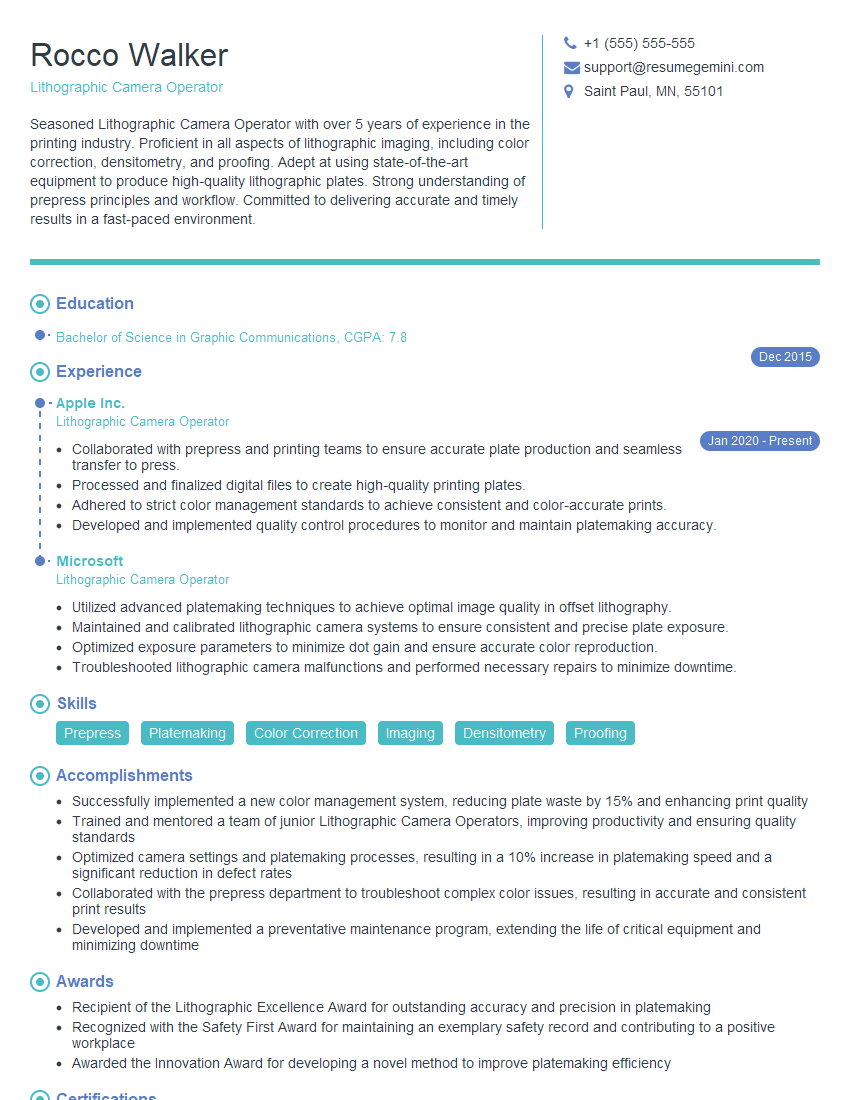Are you a seasoned Lithographic Camera Operator seeking a new career path? Discover our professionally built Lithographic Camera Operator Resume Template. This time-saving tool provides a solid foundation for your job search. Simply click “Edit Resume” to customize it with your unique experiences and achievements. Customize fonts and colors to match your personal style and increase your chances of landing your dream job. Explore more Resume Templates for additional options.

Rocco Walker
Lithographic Camera Operator
Summary
Seasoned Lithographic Camera Operator with over 5 years of experience in the printing industry. Proficient in all aspects of lithographic imaging, including color correction, densitometry, and proofing. Adept at using state-of-the-art equipment to produce high-quality lithographic plates. Strong understanding of prepress principles and workflow. Committed to delivering accurate and timely results in a fast-paced environment.
Education
Bachelor of Science in Graphic Communications
December 2015
Skills
- Prepress
- Platemaking
- Color Correction
- Imaging
- Densitometry
- Proofing
Work Experience
Lithographic Camera Operator
- Collaborated with prepress and printing teams to ensure accurate plate production and seamless transfer to press.
- Processed and finalized digital files to create high-quality printing plates.
- Adhered to strict color management standards to achieve consistent and color-accurate prints.
- Developed and implemented quality control procedures to monitor and maintain platemaking accuracy.
Lithographic Camera Operator
- Utilized advanced platemaking techniques to achieve optimal image quality in offset lithography.
- Maintained and calibrated lithographic camera systems to ensure consistent and precise plate exposure.
- Optimized exposure parameters to minimize dot gain and ensure accurate color reproduction.
- Troubleshooted lithographic camera malfunctions and performed necessary repairs to minimize downtime.
Accomplishments
- Successfully implemented a new color management system, reducing plate waste by 15% and enhancing print quality
- Trained and mentored a team of junior Lithographic Camera Operators, improving productivity and ensuring quality standards
- Optimized camera settings and platemaking processes, resulting in a 10% increase in platemaking speed and a significant reduction in defect rates
- Collaborated with the prepress department to troubleshoot complex color issues, resulting in accurate and consistent print results
- Developed and implemented a preventative maintenance program, extending the life of critical equipment and minimizing downtime
Awards
- Recipient of the Lithographic Excellence Award for outstanding accuracy and precision in platemaking
- Recognized with the Safety First Award for maintaining an exemplary safety record and contributing to a positive workplace
- Awarded the Innovation Award for developing a novel method to improve platemaking efficiency
Certificates
- G7 Expert
- Fogra Certified
- PSO Certified
- ISO 12647 Certified
Career Expert Tips:
- Select the ideal resume template to showcase your professional experience effectively.
- Master the art of resume writing to highlight your unique qualifications and achievements.
- Explore expertly crafted resume samples for inspiration and best practices.
- Build your best resume for free this new year with ResumeGemini. Enjoy exclusive discounts on ATS optimized resume templates.
How To Write Resume For Lithographic Camera Operator
- Highlight your technical skills and experience in prepress, platemaking, color correction, imaging, densitometry, and proofing.
- Showcase your knowledge of lithographic cameras, equipment, and industry-standard software.
- Emphasize your ability to produce high-quality lithographic plates that meet industry standards.
- Quantify your accomplishments and provide specific examples of your contributions to previous projects.
Essential Experience Highlights for a Strong Lithographic Camera Operator Resume
- Operate lithographic cameras to create film positives and negatives for lithographic printing
- Calibrate and maintain lithographic cameras and related equipment
- Perform color correction and image enhancement on digital and traditional images
- Produce accurate and consistent lithographic plates using advanced imaging techniques
- Troubleshoot and resolve issues related to lithographic imaging and platemaking
- Supervise and train junior staff on lithographic camera operation and maintenance
Frequently Asked Questions (FAQ’s) For Lithographic Camera Operator
What are the key skills required for a Lithographic Camera Operator?
Key skills for a Lithographic Camera Operator include prepress, platemaking, color correction, imaging, densitometry, proofing, lithographic cameras, equipment, and industry-standard software.
What is the typical work environment for a Lithographic Camera Operator?
Lithographic Camera Operators typically work in fast-paced, production-oriented environments. They may work alongside other prepress professionals, such as platemakers, press operators, and bindery workers.
What are the career advancement opportunities for a Lithographic Camera Operator?
Lithographic Camera Operators can advance their careers by becoming Lithographic Press Operators, Prepress Supervisors, or Production Managers. With additional training, they may also become Color Correction Specialists or Digital Imaging Technicians.
What is the job outlook for Lithographic Camera Operators?
The job outlook for Lithographic Camera Operators is expected to decline slightly over the next decade. This is due to advances in digital printing technology, which is reducing the demand for traditional lithographic printing.
What are the salary expectations for a Lithographic Camera Operator?
The salary expectations for a Lithographic Camera Operator can vary depending on their experience, skills, and location. According to Indeed, the average salary for a Lithographic Camera Operator in the United States is around $45,000 per year.
What are the educational requirements for a Lithographic Camera Operator?
Most Lithographic Camera Operators have a high school diploma or equivalent. Some employers may prefer candidates with a degree or certification in graphic arts or printing technology.
What are the certifications available for Lithographic Camera Operators?
There are several certifications available for Lithographic Camera Operators, including the Lithographic Professional certification from the Printing and Imaging Association (PIA) and the Certified Lithographic Press Operator (CLPO) certification from the National Association of Graphic Arts (NAGA).
What are the professional organizations for Lithographic Camera Operators?
Professional organizations for Lithographic Camera Operators include the Printing and Imaging Association (PIA) and the National Association of Graphic Arts (NAGA).